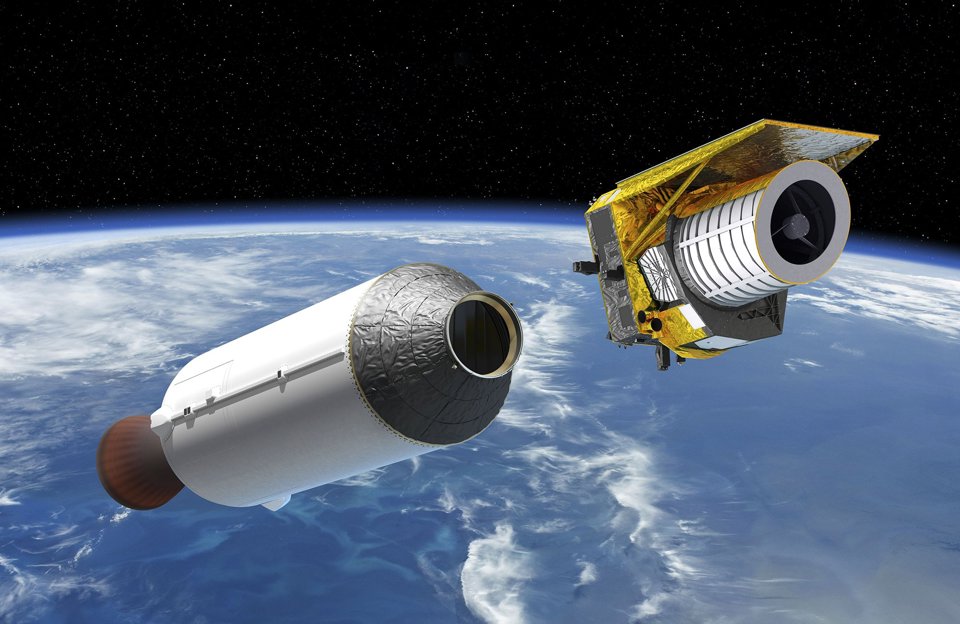Empowering Euclid Mission
The Euclid Mission, launched by the European Space Agency (ESA), is a groundbreaking venture aimed at unraveling the mysteries of dark matter and dark energy in the universe.
Launched in 2023, the Euclid mission involves a space telescope equipped with sophisticated instruments designed to map and measure the shapes, positions, and distances of galaxies across billions of light-years.
Our involvement in this mission is a source of pride. We have played a pivotal role in ensuring the sustained and reliable operation of the satellite. Through our contributions of flight equipment and systems for testing and operations, we have supported the Euclid mission to unlock the fundamental mysteries of our cosmos. Data gathered by Euclid is anticipated to revolutionize our understanding of fundamental cosmic forces, offering insights that could reshape astrophysics and cosmology.
About the Euclid Mission
- Launch: July, 2023
- Type of mission: Scientific
- Operator: ESA
- Prime Contractor: Thales Alenia Space
- Destination: Sun-Earth Lagrange point 2,1.5 million km from Earth

"Terma has been an invaluable partner in Euclid Mission. They provided high-quality flight equipment and systems for testing and operations that ensured the sustained and reliable operation of the satellite. We truly appreciated their professional approach and reliable technology, which complemented our efforts seamlessly."
Paolo Musi
Director of Science Projects for TAS Italy, Thales Alenia Space
Terma's Contribution to the Euclid Space Telescope
At Terma, our history of expertise in innovative space technology is a source of delight, and our contribution to the Euclid satellite mission is no exception.
Here are some key highlights of our contribution:
- Power Conditioning and Distribution Unit (PCDU)
- Ground Testing Equipment
- Operational Simulator for Flight Control
- Pre-Launch Power Supply

Integrating Complex Subsystems for Euclid Simulator
Designing and tailoring a reliable simulator specifically for the Euclid mission was challenging due to the integration of multiple complex subsystems with ground stations. The project had to fulfill a list of requirements, consolidating the functionality and behavior of the desired spacecraft simulator. It was crucial for the simulator to support all training scenarios for operation preparation without encountering any blocking issues.
In meeting the challenge of developing a reliable Euclid mission simulator, we focused on three key objectives:
- Verifying mission control facilities
- Validating operation procedures
- Training the operation team
Through close communication with the customer, we developed a fully functional operational simulator that seamlessly integrated complex subsystem components and ground stations. The simulator not only supported all training scenarios but also provided crucial problem investigation support.
Our simulator runs the on-board software (OBSW) unmodified, compared to that of the real spacecraft. This allowed it to simulate the realistic behavior of the spacecraft in both operational and contingency scenarios. This advanced feature played a key role in the exhaustive training sessions conducted over the crucial 5 months before the launch. We believe these efforts significantly contributed to the smooth operation of the spacecraft in both the launch and early operational phases.
Cost Efficiency Enhancement for Euclid's AIT Program
It is always a major challenge for spacecraft integrators to keep Assembly, Integration and Test (AIT) costs under control.
We provided the essential test equipment (EGSE) for the EUCLID's ground testing, ensuring spacecraft readiness for the challenging space environment. This included a number of Special Checkout Equipment (SCOEs) and the CCS5 based Central Checkout System that boasts user-friendly, intuitive interfaces, and deliver high performance and usability. At Terma, we are proud to have supplied many key elements of the Euclid EGSE that helped contribute to this success. Our equipment also allows for the full automation of tests – essential to keeping the quality and efficiency of the testing at a high level.
Adapting Flight Equipment to Meet Unique Requirements
Nearly all flight equipment within the Euclid project demanded modifications to align with the challenging mission requirements. Power Conditioning and Distribution Unit (PCDU) was not an exception.
To fulfill the Euclid mission's stringent radiation tolerance demands, we designed our power systems with a modular architecture, ensuring tailored solutions while leveraging standardized, qualified technology for easier assembly, integration, and testing. Our PCDU employs cutting-edge technology for improved reliability and power efficiency, minimizing unit mass through high-frequency switched-mode power conversion.
Ensure Reliability of power systems
Developing reliable electrical power systems for the Euclid mission involved not just designing efficient components but also conducting power testing. This was crucial to ensure the consistent and efficient performance of the satellite's power generation, storage, and distribution components.
Terma's critical role in supplying power to the Euclid satellite during pre-launch preparations at the launch site is underscored by the necessity for high power density, multifunctional configurability, and a robust system guaranteeing safety and efficiency. The power is supplied through an umbilical connection, which ensures the satellite receives the necessary power to undergo final tests and system verifications.
The outcome
The successful launch of the Euclid satellite on a SpaceX Falcon 9 rocket in July 2023 marked the beginning of an unprecedented astronomical endeavor. Over its nominal six-year mission, Euclid will capture optical and near-infrared images spanning more than one-third of the extragalactic sky, unveiling billions of cosmic targets up to 10 billion light-years away with unparalleled clarity - four times sharper than ground-based surveys.
Our pivotal role in supplying flight equipment and systems for testing and operations ensures the sustained and reliable operation of the satellite. With our expertise, we contribute to the mission of building an unprecedented data archive, advancing research across all astronomy disciplines. The Euclid mission, powered by our support, marks a significant stride in unraveling the mysteries of the dark Universe.




